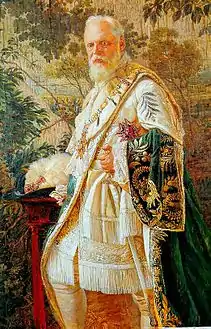لودفيش الثالث ملك بافاريا
لودفيش الثالث في بافاريا (بالألمانية: Ludwig Luitpold Josef Maria Aloys Alfried) واسمه الكامل لويس ليوبولد جوزيف ماري آلويسيوس ألفريد، من مواليد 7 يناير عام 1845م، وتوفي بتاريخ 18 أكتوبر عام 1921م، وهو آخر ملوك في بافاريا .[2][3][4]
| لودفيش الثالث ملك بافاريا | |
|---|---|
| (بالألمانية: Ludwig III.) | |
 | |
| معلومات شخصية | |
| الميلاد | 7 يناير 1845 ميونخ |
| الوفاة | 18 أكتوبر 1921 (76 سنة) |
| مكان الدفن | كاتدرائية السيدة العذراء |
| مواطنة | |
| الديانة | الكنيسة الرومانية الكاثوليكية |
| عضو في | الأكاديمية البافارية للعلوم والعلوم الإنسانية |
| الزوجة | ماريا تيريزا من النمسا-إستي (20 فبراير 1868–3 فبراير 1919)[1] |
| إخوة وأخوات | |
| عائلة | فيتلسباخ |
| الحياة العملية | |
| المدرسة الأم | جامعة لودفيغ ماكسيميليان في ميونخ |
| المهنة | عسكري |
| الخدمة العسكرية | |
| الرتبة | فيلد مارشال |
| المعارك والحروب | الحرب العالمية الأولى |
| الجوائز | |
مصادر
- مُعرِّف شخص في موقع "النُبلاء" (thepeerage.com): https://wikidata-externalid-url.toolforge.org/?p=4638&url_prefix=https://www.thepeerage.com/&id=p10134.htm#i101333 — تاريخ الاطلاع: 7 أغسطس 2020
- Germany declared war on Russia on 1 August 1914, and on France two days later.
-
See, e.g., Toland, John (1976). Adolf Hitler. New York: W.W. Norton & Company. صفحات 57–58. ISBN 0-385-03724-4. الوسيط
|CitationClass=تم تجاهله (مساعدة) ("Toland") and Large, David C. (1997). Where Ghosts Walked: Munich's Road to the Third Reich. New York: Doubleday & Company. صفحات 48–49. ISBN 0-393-03836-X. الوسيط|CitationClass=تم تجاهله (مساعدة) ("Large"). - This account is based on Hitler's recollections in Mein Kampf, which is often notoriously unreliable as Hitler was (at least by 1924) an accomplished liar. Kershaw holds that Hitler's story is simply not credible on its face, due to the remarkable bureaucratic effort it would have required to attend to this minor matter during days of extreme crisis. Kershaw suggests that bureaucratic error, rather than bureaucratic efficiency, was responsible for Hitler's enlistment; indeed, as a national of an allied country, he should have been sent to Austria for service in that army. Based on Bavarian government investigations in 1924, the more likely scenario in Kershaw's view is that Hitler applied for enlistment, along with thousands of other youths, on or about 5 August 1914, was initially turned away because the authorities were overwhelmed with applicants and had no place to assign him, and eventually was recalled to serve in the 2nd Infantry Regiment (2nd Battalion), before being assigned to Bavarian Reserve Infantry Regiment 16 (the List Regiment), which was principally made up of raw recruits. Kershaw, Ian (1999). Adolf Hitler 1889–1936: Hubris. New York: W.W. Norton & Company. صفحات 89–90. ISBN 0-393-04671-0. الوسيط
|CitationClass=تم تجاهله (مساعدة) ("Kershaw").
في كومنز صور وملفات عن: لودفيش الثالث ملك بافاريا
- بوابة أعلام
- بوابة ألمانيا
- بوابة الإمبراطورية الألمانية
- بوابة بافاريا
- بوابة ملكية
This article is issued from Wikipedia. The text is licensed under Creative Commons - Attribution - Sharealike. Additional terms may apply for the media files.
